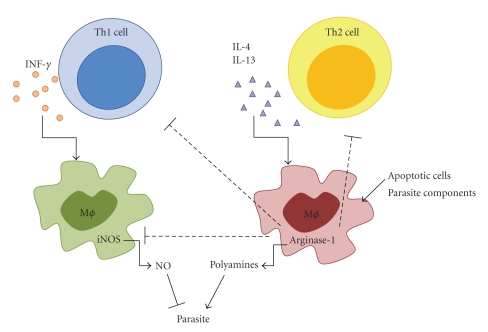Figure 1.
Role of macrophage activation in parasitic infections. A type 1 cytokine-dependent proinflammatory response inducing classically activated macrophages (CaMϕs) leads to NO production and also to the synthesis of several products of NO reaction. CaMϕs are crucial for parasite control during protozoan infections but can also contribute to the development of immunopathological disease symptoms. Type 2 cytokines such as IL-4 and IL-13 antagonize CaMϕs inducing alternatively activated macrophages (AaMϕs) that upregulate arginase-1 expression. Arginase-1 can also be induced during the infection by apoptotic cells or even directly by parasites or parasite components. Arginase-1 limits CaMϕ-dependent parasite clearance promoting parasite proliferation. Additionally, arginase-1 suppresses T cell response. Therefore, generation of alternative activation states of macrophages could limit collateral tissue damage because of excessive type 1 inflammation. However, they affect disease outcome by promoting parasite survival and proliferation.

